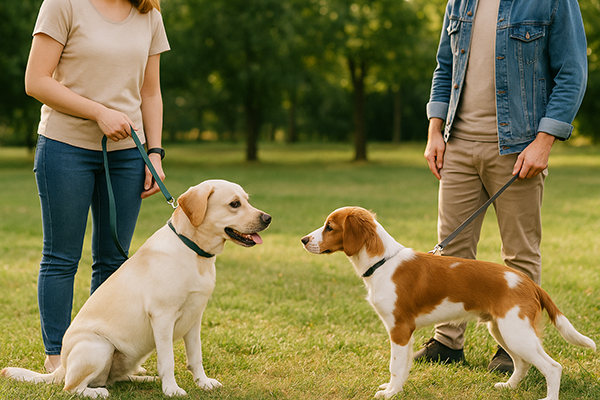
🐶 Full Article: How to Teach Your Dog to Stay Calm Around Other Dogs
Some dogs bark, lunge, or freeze when they see another dog — even if they’re friendly. Whether it’s excitement or anxiety, teaching your dog to stay calm around other dogs is an essential skill for stress-free walks and safe socialization.
Let’s break down how to help your dog stay relaxed and confident.
🧠 Why Dogs React Around Other Dogs
- Overexcitement (they want to play!)
- Fear or bad past experiences
- Lack of socialization
- Protective or territorial behavior
- Poor leash manners
✅ 6 Steps to Teach Calm Dog-to-Dog Behavior
1. Create Space First
Distance is your friend. Start training far away from other dogs — where your dog can still see them but not react.
2. Reward Calm Behavior
As soon as your dog notices another dog and remains calm, mark it with a “Yes!” or click — then treat.
✔️ You’re reinforcing the idea: calm = reward.
3. Use Focus Commands
Teach a “Look at me” or “Watch” cue. Use it before your dog locks eyes on another dog and begins to escalate.
4. Practice Parallel Walking
Ask a friend with a calm dog to help. Walk parallel (not face-to-face), slowly decreasing distance as your dog relaxes.
5. Avoid Dog Park Chaos
Dog parks often overstimulate reactive or nervous dogs. Choose 1-on-1 controlled meetings instead.
6. Know When to Exit
If your dog starts panting, whining, or fixating, end the session early. It’s better to succeed short-term than risk meltdown.
🛠️ Helpful Tools
- Harness with front-clip – better control
- Clicker – for marking calm behavior
- Treat pouch – quick reward access
- Calming spray or essential oils for anxious dogs
❌ Mistakes to Avoid
- Pulling on leash or yanking
- Forcing interactions too early
- Waiting too long before correcting
❤️ Final Thoughts
Teaching your dog to be calm around other dogs doesn’t happen overnight — but with space, repetition, and rewards, it’s 100% possible. You’re not just managing behavior — you’re building your dog’s confidence and emotional control.
Train calm. Walk proud.
